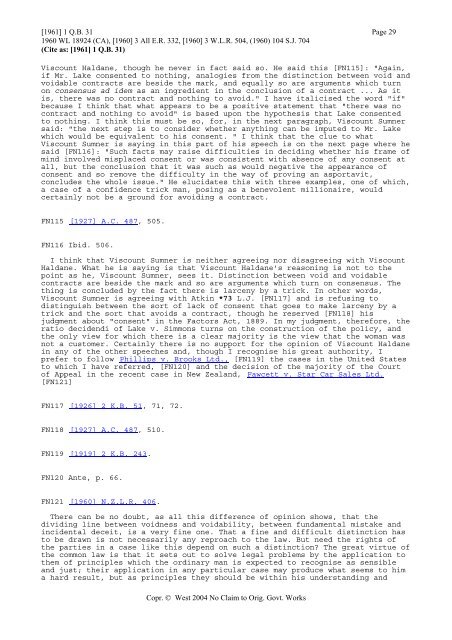Tesco v Constain - Thomson Reuters
Tesco v Constain - Thomson Reuters
Tesco v Constain - Thomson Reuters
Create successful ePaper yourself
Turn your PDF publications into a flip-book with our unique Google optimized e-Paper software.
[1961] 1 Q.B. 31 Page 291960 WL 18924 (CA), [1960] 3 All E.R. 332, [1960] 3 W.L.R. 504, (1960) 104 S.J. 704(Cite as: [1961] 1 Q.B. 31)Viscount Haldane, though he never in fact said so. He said this [FN115]: "Again,if Mr. Lake consented to nothing, analogies from the distinction between void andvoidable contracts are beside the mark, and equally so are arguments which turnon consensus ad idem as an ingredient in the conclusion of a contract ... As itis, there was no contract and nothing to avoid." I have italicised the word "if"because I think that what appears to be a positive statement that "there was nocontract and nothing to avoid" is based upon the hypothesis that Lake consentedto nothing. I think this must be so, for, in the next paragraph, Viscount Sumnersaid: "the next step is to consider whether anything can be imputed to Mr. Lakewhich would be equivalent to his consent. " I think that the clue to whatViscount Sumner is saying in this part of his speech is on the next page where hesaid [FN116]: "Such facts may raise difficulties in deciding whether his frame ofmind involved misplaced consent or was consistent with absence of any consent atall, but the conclusion that it was such as would negative the appearance ofconsent and so remove the difficulty in the way of proving an asportavit,concludes the whole issue." He elucidates this with three examples, one of which,a case of a confidence trick man, posing as a benevolent millionaire, wouldcertainly not be a ground for avoiding a contract.FN115 H[1927] A.C. 487, 505.FN116 Ibid. 506.I think that Viscount Sumner is neither agreeing nor disagreeing with ViscountHaldane. What he is saying is that Viscount Haldane's reasoning is not to thepoint as he, Viscount Sumner, sees it. Distinction between void and voidablecontracts are beside the mark and so are arguments which turn on consensus. Thething is concluded by the fact there is larceny by a trick. In other words,Viscount Sumner is agreeing with Atkin *73 L.J. [FN117] and is refusing todistinguish between the sort of lack of consent that goes to make larceny by atrick and the sort that avoids a contract, though he reserved [FN118] hisjudgment about "consent" in the Factors Act, 1889. In my judgment, therefore, theratio decidendi of Lake v. Simmons turns on the construction of the policy, andthe only view for which there is a clear majority is the view that the woman wasnot a customer. Certainly there is no support for the opinion of Viscount Haldanein any of the other speeches and, though I recognise his great authority, Iprefer to follow HPhillips v. Brooks Ltd., [FN119] the cases in the United Statesto which I have referred, [FN120] and the decision of the majority of the Courtof Appeal in the recent case in New Zealand, HFawcett v. Star Car Sales Ltd.[FN121]FN117 H[1926] 2 K.B. 51, 71, 72.FN118 H[1927] A.C. 487, 510.FN119 H[1919] 2 K.B. 243.FN120 Ante, p. 66.FN121 H[1960] N.Z.L.R. 406.There can be no doubt, as all this difference of opinion shows, that thedividing line between voidness and voidability, between fundamental mistake andincidental deceit, is a very fine one. That a fine and difficult distinction hasto be drawn is not necessarily any reproach to the law. But need the rights ofthe parties in a case like this depend on such a distinction? The great virtue ofthe common law is that it sets out to solve legal problems by the application tothem of principles which the ordinary man is expected to recognise as sensibleand just; their application in any particular case may produce what seems to hima hard result, but as principles they should be within his understanding andCopr. © West 2004 No Claim to Orig. Govt. Works
















